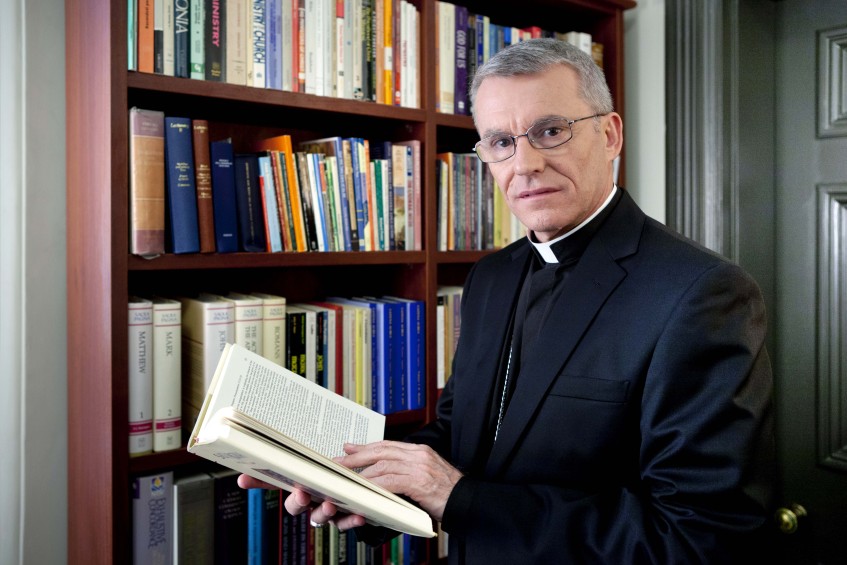Archbishop Costelloe: No change to definition of marriage

Archbishop Timothy Costelloe SDB has this week said the Catholic Church, through its official teaching, cannot support proposals for the changing of the legal definition of marriage to include same sex couples. Photo: Ron Tan.
By Jamie O’Brien
Archbishop Timothy Costelloe SDB has this week said the Catholic Church, through its official teaching, cannot support proposals for the changing of the legal definition of marriage to include same sex couples.
In a Pastoral Letter to be distributed to all parishes this coming weekend, Archbishop Costelloe has clarified the reasons for the Church’s teaching and encouraged all to reflect deeply on the issue.
Archbishop Costelloe’s Pastoral Letter comes following a decision by the Federal Government to hold a non-compulsory postal plebiscite on the redefinition of marriage, after Labor and the Greens last week 9 August successfully blocked a bill to hold a plebiscite. At the time of going to press, a High Court challenge to the postal vote was being prepared to be lodged by Labor, the Greens and cross-bench senators.
The Federal Government has not provided a draft of the legislation that will be passed in the event that the majority of voters are in favour of the redefinition of marriage, however a Private Member’s Bill was recently prepared by Western Australian Liberal Senator Dean Smith, which, if successful, will remove existing restrictions to allow “two people” to marry, ‘regardless of their sex or gender’.
The bill will reportedly provide religious freedom protections only to ministers of religion and civil celebrants, while offering no protection to ordinary Australians who have a traditional view of marriage.
Catholics across Australia are also now being encouraged to ensure their electoral roll details are up to date via www.aec.gov.au/enrol
Having previously written about the issue of same-sex marriage in 2015, Archbishop Costelloe said that in affirming this long-standing position, it is important to remember that it is based on our [the Church’s] convictions about the beauty and dignity of marriage understood as the union of a man and a woman for life, and as the best way to provide for the upbringing of children.
“Furthermore, it is a position based on the principle that in making decisions about such an important matter, both the desires and needs of the individuals concerned, and the stability and well-being of our society as a whole, must be given careful consideration,” he said.
The Church’s teaching, said the Archbishop, are grounded in our [the Church’s] religious convictions, and especially in our [the Church’s] belief in a personal God who is the creator and sustainer of all life, and whose creative design is written into the nature of creation itself and especially into the nature of humanity.
“That our convictions are based on these foundational beliefs should not be a surprise to anyone: we are a religious organisation,” he said.
The Archbishop went on to highlight that the religious foundations of the Catholic community’s convictions should not disqualify them from engagement in the public discussion on these important matters.
“Belief in God is no less worthy a way to approach these questions than is the denial of the existence of God, or the belief that the “God-question” is irrelevant,” Archbishop Costelloe said.
“There are many ways of understanding life and many ways of forming views about what will ultimately lead to greater human flourishing and what, on the contrary, will hinder this flourishing.
“The Catholic community, no less than any other in our society, has a right to propose its views about what will best serve the interests of our society as a whole,” he said.
Archbishop Costelloe continues by explaining that put simply, the Catholic tradition takes the view that our society is best served by retaining the traditional understanding of marriage as the union of a man and a woman, voluntarily entered into for life, which provides the basis for the creation of a family in which, wherever possible, children can be raised in a loving and stable environment by their own mother and father.
“We acknowledge that not everyone shares this view, but it is a position that until recently has been widely held by most societies, including those which have foundations in the Judeo-Christian heritage,” Archbishop Costelloe said.
“This view presumes that marriage is about more than the mutual love between two people: it is also about the creation of a family,” he said.
Click Here to read Archbishop Timothy Costelloe’s Pastoral Letter on Same-Sex Marriage
